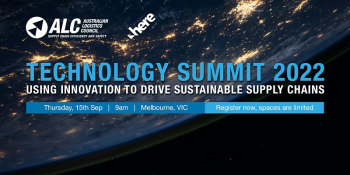
Our world is changing and it is going to look markedly different than it has. With that our operating environment changes too. Emerging technologies, big data and innovation across the supply chain is driving sustainability and improving efficiency. Disruption and events out of our control have forced new thinking and a focus on resilience. Tech Summit 2022 puts into focus key policy areas that are essential in shaping the future sustainability of the supply chain, driven by innovative thinking and technology. Our panellists will add a new perspective, build on the success of previous thought leaders and drive discussion about where we are now and where we are going.
Check out more information about our panel sessions...
Optimisation and simulation - leveraging analytics and data to deliver efficiency
From one end of the supply chain to the other, there is big data to be captured to provide real insight to underpin decisions that deliver significant efficiency gains. Data insights inform simulation that supports planners to achieve optimisation. It is no longer a fantasy; data is already helping leading organisations transform the performance of the supply chain. There is more work to be done, with the freight and logistics chain struggling to harness cross-modal data to successfully transform and optimize how they function. The key is technical capability and the technology to capture and evaluate supply chain data. How can supply chain participants leverage data analytics to improve efficiency?
Global trends on Road User Charging
Around the world, governments are experiencing declining fuel tax revenues, owing to the take-up of electric vehicles, fuel efficient technology and fleet optimisation. To maintain investment in infrastructure, policymakers need to consider alternative revenue sources to sustain transport infrastructure, such as a Road User Charge (RUC). Intelligent transport systems, in-vehicle technology and a wide range of approaches can enable fair and efficient charging systems. Many nations have implemented RUC's in various forms across Europe, North America and in New Zealand. Australia will inevitably confront the RUC question, what can we takeaway from international models, what will it take to get there, are there any benefits for industry and what are the challenges?
Supporting carbon-neutral freight
The freight and logistics industry acknowledges the role it has to play in achieving net-zero, reducing environmental impacts and decarbonising freight. Across all modes of transport, manufacturing, warehousing and for all supply chain participants, there is work to be done, to achieve a sustainable, economical supply chain. There are a number of enterprise-level programs and investments underway, how can industry, government and the community help to support a carbon neutral supply chain?
Advanced safety systems - saving lives and enhancing productivity
Safety is everyone's business and it is critically important in the supply chain that a focus is maintained on constantly improving our approach to safety. Considerations in safety are about protecting the workforce, reducing risk, and easing the burden on supply chain assets. They all contribute to saving lives and improving productivity. The industry has come a long way on the safety journey, with significant leaps forward - what is next and how do we advance our approach to safety?